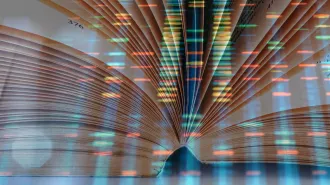In the nanoworld, the division between wet biology and dry electronics can disappear. As a demonstration, researchers have devised a nanowire sensor that binds to DNA molecules and produces an electrical signal almost instantaneously. Such direct detection of DNA could enable physicians to use a single drop of blood to swiftly screen patients for myriad genetic disorders.

The sensor, developed by chemist Charles Lieber of Harvard University and Jong-in Hahm, now of the Pennsylvania State University in State College, consists of a silicon wire several microns long and 20 nanometers wide. That’s the width of a common cold virus. The small-scale system detects a genetic mutation that underlies cystic fibrosis, a lung-clogging disorder that affects about 30,000 people in the United States.
To detect the mutation, the researchers placed the wires on a silicon surface and fixed an electrode to each of the wires’ ends. They then coated the wires with receptors harboring fragments of DNA that are complementary to the normal sequence of the gene implicated in cystic fibrosis.
When a sample containing DNA passed over the nanowire, the relevant DNA bound to the receptor and the nanowire’s conductivity increased. Normal DNA formed tight bonds with the receptor DNA, boosting the nanowire’s conductivity dramatically. Mutant DNA, on the other hand, bound to the receptor only loosely, resulting in a much smaller increase in conductivity. Lieber and Hahm describe their results in the Jan. 14 Nano Letters.
Not only can the nanowires respond to a gene within seconds, but they also generate measurable signals from just a few DNA molecules, says Hahm.
Existing genetic-screening technologies are more cumbersome. To obtain a strong signal, clinicians have to extract DNA from cells, produce many copies of it, label it with fluorescent tags, and then measure the fluorescence after it binds to detectors. The new nanowire skirts those time-consuming steps.
“What’s also great about this technique is its versatility,” says Hahm. In the cystic fibrosis demonstration, the nanowires detected a particular gene mutation that accounts for 70 percent of the disease’s cases. Scientists have identified hundreds of additional mutations in this same gene that appear to underlie the remaining 30 percent of cases. With the new biosensor method, researchers could pack a chip with hundreds of wires–each tailored to a specific mutation–and hook them up to arrays of electrodes so that their individual signals could be read out. Such a device could detect all the cystic fibrosis mutations simultaneously from a single blood sample.
Because the nanowires are so tiny, researchers could eventually pack millions of them onto a chip and rapidly test a blood sample for all the known genetic mutations in the human genome. The sensor could do this at a fraction of the cost of current genetic screens, says Hahm.
“What’s exciting here is that the researchers expanded the capability of the nanowires to detect DNA,” says Yi Cui, a chemist at the University of California, Berkeley. The same silicon nanowires used to make these DNA sensors have been used by Lieber’s team to make nanoscale transistors for computing devices.
Compared with complex computer circuitry, Lieber says, the DNA sensors “are probably one of the most realistic near-term applications of nanoscience.”
****************
If you have a comment on this article that you would like considered for publication in Science News, send it to editors@sciencenews.org. Please include your name and location.





